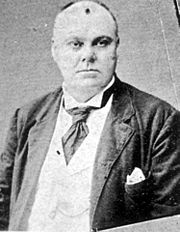.gif)
Henry Black (rakugoka)
Encyclopedia

Kabuki
is classical Japanese dance-drama. Kabuki theatre is known for the stylization of its drama and for the elaborate make-up worn by some of its performers.The individual kanji characters, from left to right, mean sing , dance , and skill...
actor and Japan
Japan
Japan is an island nation in East Asia. Located in the Pacific Ocean, it lies to the east of the Sea of Japan, China, North Korea, South Korea and Russia, stretching from the Sea of Okhotsk in the north to the East China Sea and Taiwan in the south...
's only foreign-born rakugoka
Rakugo
is a Japanese verbal entertainment. The lone sits on the stage, called the . Using only a paper fan and a small cloth as props, and without standing up from the seiza sitting position, the rakugo artist depicts a long and complicated comical story...
, or public storyteller, performing under the name . He was also known by the name Ishii Black . His father was J. R. Black
J. R. Black
John Reddie Black was a Scottish publisher, journalist, writer, photographer, and singer. Much of his career was spent in China and Japan where he published several newspapers including The Far East, a fortnightly newsmagazine illustrated with original photographs.-Early life:John Reddie Black was...
, singer and publisher of several newspapers in Japan, including The Far East
The Far East (periodical)
The Far East was a newsmagazine published by J. R. Black in Yokohama, Japan between 1870 and 1878. The periodical was illustrated with original, pasted-in photographs, at a time when photomechanical reproduction was still in its infancy...
.
Black was born in Adelaide, Australia on 22 December 1858 and had lived in Japan since he was three years old. Following in his father’s entertainer streak, he became the first foreign-born Kabuki actor.
Black worked as an English teacher for about ten years, even publishing a textbook during that time. He had picked up Japanese in part by hanging round his father’s publishing company, and began appearing on stage telling entertaining stories about famous European historical figures. His audience was astounded to see a foreigner not only fluent in Japanese but also able to make them laugh into the bargain. He published some of these stories in book form. By the early 90s, English teaching had declined in popularity, and Black took up rakugo in defiance of his mother and brother, who felt it was not only undignified but also unstable work. The rakugo master, Sanyutei Encho gladly took him under his wing.
In March 1891, Black adopted the stage name Kairakutei (Pleasure) Black |快楽亭ブラック|and soon after tried his hand at acting on the Kabuki stage. He was an instant hit, playing female roles, and continued to issue printed versions of his rakugo stories. His mother, and especially his brother, John were increasingly hostile. John actually burst into one of his performances and succeeded in bringing it to an early end by loudly yelling out insults and calling him an embarrassment to the family. The following year, Black reacted by taking Japanese nationality, and the name Ishii Black. He had been adopted by Ishii Mine, a sweet shop owner, and appears to have largely severed links with his family from that point.
Black married Mine’s daughter, Aka but the marriage ended in divorce within two years. In 1903, Black made possibly the first gramophone recording in Japan, one of his stories, for the British Gramophone Company. In 1904, he unveiled his comic masterpiece, “Biiru no Kakenomi” (The Beer Drinking Bet) in which a man’s friend bets him he can’t drink fifteen bottles of beer in one sitting. The man accepts the challenge but drops into a pub on the way over to check that he can manage it (with the obvious result that he was already too inebriated to drink another fifteen before he even got started.) A version of this story is still a popular rakugo tale even today.
Black was continually on tour but as time passed he became depressed about his declining popularity and falling earnings. He attempted suicide in 1908 by drinking arsenic, but survived. His career slowly wound down, and he lived with his adopted son, Ishii Seikichi, another entertainer and his family. Ishii Black died of a stroke on 19 September 1923 at the age of 64 and is buried in Yokohama Foreign Cemetery.

